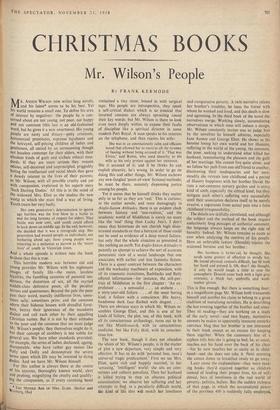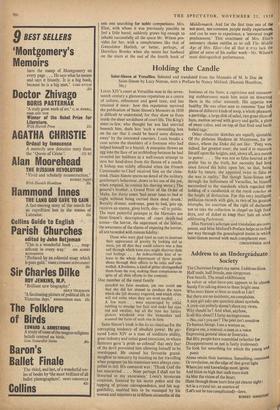CHRISTMAS BOOKS
Mr. Wilson's People BY FRANK KERM ODE R. ANGUS WILSON now writes long novels, VI and his latest* seems to be his best, Yet his world remains a small one. To define his area of Interest by negatives : the people he is con- cerned about are not young, not poor, not happy and not common (this last is an old-fashioned word, but he gives it a new smartness). His young people are nasty and dreary—petty criminals, homosexual prostitutes, espresso layabouts and the betrayed, self-pitying children of ladies and gentlemen, all united by an unreasoning though not baseless contempt for their elders, with their obsolete kinds of guilt and archaic ethical stan- dards. If they are more serious they remain odious, self-deceived and unprincipled, priggishly hating the intellectual and social ideals that gave a dowdy interest to the lives of their parents; as Mr. Wilson, with all possible cruelty and yet with compassion, explained in his superb story Such Darling Dodos.' All this is in the mind of the widowed Mrs. Eliot as she studies the new World in which she must find a way of living. Youth treats her very badly.
Her own generation's determination to ignore age barriers was the first blow in a battle to end the long tyranny of respect for elders. That battle was now over, and youth could afford to look down on middle age. In the end, however, she decided that it was a retrograde step. Her generation had treated people as individuals, not bothering about age; these young people were returning to a seclusion as narrow as the 'secret lives' of youth in Victorian times.
And a whole episode is written into the book to show that this is true.
This horrible modern war between old and Young provides Mr. Wilson with his nightmare [ages of family life—the mean, loveless loyalties, the fumbling anxieties of parental ten- derness, the distortion of sex, all the myriad middle-class defensive poses, all the peculiar terrors and queernesses. Beyond the pale the poor Pass their weird, morally indifferent lives, some- times salty, sometimes prim; and the common adorn their hideous houses with dreadful furni- ture, betray their ignorance of the mandarin dialect and call each other by their appalling Christian names. But it is not by their attitudes to the poor and the common that we must judge Mr. Wilson's people; they themselves might do it, but their concept of snobbery is too subtle for general use. We have other standards provided; for example, the series of ladies, declassed, ageing, disreputable, who have rather gay names like Polly and Dolly and demonstrate the severe terms upon which life may be 'restored to dying dodos. And we have Mr. Wilson himself.
For this author is always there at the centre of his anxious, thoroughly known world, alert and probing, magnifying the cruelty and qualify- ing the compassion, as if every caressing hand
THE MIDDLE AGE OF MRS. ELIOT. (Seeker and Warburg, I8s)
contained a tiny razor, bound in with surgical tape. His people are introspective, they speak a self-critical dialect which is so ironical that inverted commas are always sprouting round their key words; but Mr. Wilson is there to look even more deeply within, to expose their faults of discipline like a spiritual director in some modern Port Royal. A man speaks to his mistress on the telephone, and then rejoins his wife:
She was in an ostentatiously calm and efficient
mood that allowed her to exercise all the tyranny
of fussing without being accused of it. 'That was
Elvira,' said Robin, who used sincerity to his
wife as his only protest against her existence. She is accused of it; and if he thinks he can exploit sincerity, he's wrong. In order to go on doing this and other things, Mr. Wilson eschews any new-fangled 'point-of-view' fictional methods; he must be there, minutely dispensing justice among his people.
Yet it seems that he himself thinks they matter only in so far as they are 'real.' This is curious; in the earlier novels, and most damagingly in Anglo-Saxon Attitudes, there is an evident clash between fantasy and 'neo-realism,' and the academic world of Middleton is surely no more like the 'real' thing than Lucky Jim's. I don't mean that historians do not cherish high disin- terested standards or that a betrayal of these could not be used as evidence of a deep moral failure; but only that the whole situation as presented is like nothing on earth. Yet Anglo-Saxon Attitudes is patently an attempt to achieve the sort of accurate panoramic view of a social landscape that one associates with earlier and less fantastic fiction. There is a queer contrast between the characters and the workaday machinery of exposition, with all its cinematic transitions, flashbacks and flatly offered information—for instance, the self-por- trait of Middleton in the first chapter : 'An ex- professor . . . a sensualist . . . an msthete . . . a sixty-year-old failure . . . of the most boring kind, a failure with a conscience. His heavy, handsome dark face flushed with disgust. . . There are obvious ways in which Mr. Wilson re- sembles George Eliot, and this is one of her kinds of failure; the plot, too, of this book, with all its conscientious archaeology, turns out to be not like Midd/e/narch, with its conscientious medicine, but like Felix Holt, with its conscien- tious law.
The new book, though it does not abandon the idiom of Mr. Wilson's people, is in the matter of plot a new departure, very simple and very effective. It has to do with 'personal loss, man's universal tragic predicament.' First we see Mrs. Eliot, quite rich and happily married, in her 'amusing,' intelligent' world; she sits on com- mittees and collects porcelain. Then her husband is killed trying to stop an obscure political assassination; we observe her suffering and her attempts to find, in a peculiarly difficult world, the kind of life that will match her loneliness
and comparative poverty. A twin narrative relates her brother's troubles; he loses the friend with whom he worked and lived, and this death is slow and agonising. In the third book of the novel the narratives merge. Working slowly, accumulating observations in which time will induce a design, Mr. Wilson constantly invites one to judge him by the novelists he himself admires, especially Jane Austen and George Eliot. He shows us his heroine losing her own world and her illusions, suffering in the world of the young, the common, the poor, seeking to understand what killed her husband, remembering the pleasure and the guilt of her marriage. She cannot live quite alone, and we follow her path from one old'friend to another, discovering their inadequacies and her own; steadily she retreats into childhood and a period of illusory happiness with her brother David. He runs a not-common nursery garden and is every kind of snob, especially the ethical kind; but they mitigate each other's suffering very successfully until their association declares itself to be merely evasive, a regression from actual pain into a false childhood irresponsibility.
The details are skilfully correlated, and although the subject and the method of the book require audaciously long passages of authorial comment, the language always keeps on the right side of banality. Indeed, Mr. Wilson remains as acute as ever when analysing the motives of his people. Here an unlovable lawyer (Donald) rejoins the widowed heroine and her brother :
Her hardness is hyster:cal, he thought. She needs some gesture of affection to steady her. He found physical contacts difficult, but he took her hand and pressed it. Oh, dear! she thought, if only he would laugh a little to case the atmosphere. Donald came back with a light grey overcoat, a black hat, umbrella and wash- leather gloves.
This is fine enough. But there is something finer; in a magnificent page Mr. Wilson both transcends himself and justifies his claim to belong to a great tradition of moralising novelists. He is describing the last evening together of the brother and sister. They sit reading—they are working on a study of the early novel—and two happy, inattentive answers he makes to apparently innocent remarks convince Meg that her brother is not interested in their book except as an excuse for keeping them together. When the customary hiss of a syphon tells him she is going to bed, he, as usual,
reaches out his hand over the back of his chair —for he now touches her as easily as in child- hood—and she does not take it. Next morning
she comes down to breakfast ready to go away. Later come the explanations—they were read- ing books they'd enjoyed together as children
instead of leading their proper lives, his of self- denial, hers of loneliness in the real world of poverty, politics, bullets. But the sudden richness of that page, in which the accumulated power of the previous 400 is suddenly fully employed,
sets one searching for noble comparisons. Mrs. Eliot, with whom it was previously possible to feel a little bored, suddenly grows big enough to inhabit successfully all the space Mr. Wilson pro- vides for her, with a completeness like that of Gwendolen Harleth, or better, perhaps, of Dorothea Brooke when she meets her husband on the stairs at the end of the fourth book of Middlemarch. And for the first time one of the not-poor, not-common people really experiences, and can be seen to experience, a 'universal tragic predicament.' This enactment of Mrs. Eliot's necessary choice entitles us to call The Middle Age of Mrs. Eliot—for all that it may lack the glitter of some of his earlier work—Mr. Wilson's most distinguished performance.















































































 Previous page
Previous page